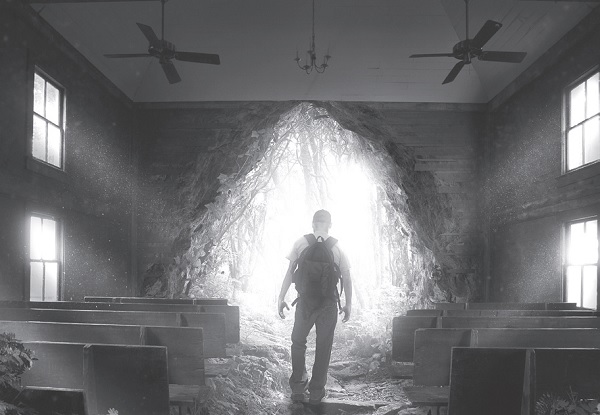Welcome home the Millennials
【Breakthrough】
Translation/Zimin

How do today’s millennial Christians view the church, the bride of Christ? The answer is: as hard as it is for them to learn to love themselves. How do I know this is true? Because I am a member of the Millennial generation myself. In my walk with Jesus, I often find myself out of sync with the church. I love Jesus, but I cannot love His Church!
The biggest reason why Millennials are leaving the church is that we no longer believe that the church has anything to do with us. She is no longer our source of answers to life’s problems. It is even harder to get Millennials to agree with the concept that "going to church is indispensable"!
A poll of Millennial Christians by The Barna Group, a well-known evangelical Christian survey organization, shows: 35% admitted that the church has little to do with them, 30% said they can meet God outside the church, and 17% said they can learn on their own. After gaining faith knowledge, 54% people said that they go to church to get closer to God, 31% people think that they go to church to know God better, and 14% people say that they go to church to become a member of the community.
Barna Group Editor-in-Chief Rossan Shi saw a clue: the reason why Millennials are reluctant to get involved in church is closely related to who they think should go to church. Millennials often think this way: Since most people believe that the purpose of going to church is to get close to God and know more about Him, then if we can find God elsewhere, or even learn more about Him through "self-study", we can improve our Spirituality, what does it matter whether you go to church or not? 11
Unless the church actively seeks to win back the hearts of Millennials, society in the future will be filled with generations of secularized Christians. The data warns that the church can no longer afford to be stuck in a rut. As Jesus taught His generation in Mark 2 - no one pours new wine into old wineskins, because the new wine will burst the old wineskins and both will be empty. Just as new wine is poured into new wineskins, it is difficult for the new fruits of youth to be borne by the gospel to survive in the traditional and conservative church. If it wants to attract millennial believers to stay, the church must practice compassion for one another among members, cultivate sincere interactive care, and become a Great Commission church with a vision and multi-generational success (win).

▲To attract millennial believers to stay, the church must practice mutual compassion, sincere interactive care, and transform into a Great Commission church with vision and multi-generational cooperation (win).
Andy's runaway story
The reason why I "ran away" from the church can be traced back to my junior year in college. At that time, my church did not have its own meeting place. Originally, we rented a local high school as a meeting venue, but finally decided to move the Sunday worship service to the campus of the university where I studied. For me, it was a complicated feeling because the auditorium rented for worship is also where I usually take biology and atmospheric science classes. Every Thursday, I take "Evolution" there, and on Sunday, I study "God's Creation" in the same place. Learning two opposing concepts at the same time did not shake my faith in God; however, what shocked me was that not only did no one in the church ever try to deal with the school staff, they even acted like they were "in the enemy's camp." . This attitude made me question the role of the church in the community. Aren’t we supposed to love our enemies? If you don’t even say anything, how can you love your enemies?
That day, my relationship with the church officially came to an end when my friend was "encouraged" to publicly repent and confess his homosexuality in front of the entire congregation after Sunday worship. I personally think that approach is quite unwise. The pastor quoted relevant scriptures in public to explain the reason for this move. My friend stood alone in front of the podium and sobbed. He was nervous and rubbed his speech notes from time to time. The tiny rustling sound coming from the microphone was quite uncomfortable. The huge chapel was completely silent except for my friend's voice.
I think the reason why my friend was willing to confess publicly was because he was desperate and felt inexplicably lost. (But which of us dares to say that we are perfect or that we have never had lustful thoughts in our hearts?)
After the service, what was even more surprising was that the congregation did not rush to hug my friend. On the contrary, a suffocating silence filled the solemn chapel. Later, everyone kept complaining and sent text messages to the friend who publicly confessed, but why didn't he reply? A protest emerged in my mind: Aren’t we the majority? Why can't we accompany that minority, think for him from his situation, and even walk an extra mile with him?
Since then, I have stopped going to my church; but I have not stopped following Jesus. I started visiting other churches in the community, or to put it bluntly, taking naps in different places. Many people came to ask me why, and the pastor also came to visit me. Deep down, I knew it was because I couldn’t agree with the church’s “force” on my friend to “publicly confess his sins and repent.” Is it wrong to leave a church? Should I stay and figure out how to turn things around? I know very well that "running away" will make me feel better, because what the church does is really embarrassing to the person involved! I heard that in the next few years, people gradually left one after another.
Others also "ran away"
In the third century, Saint Anthony, a wealthy young man in Egypt, knew God when he was young. When St. Anthony was about eighteen to twenty years old, his parents died one after another, leaving him a huge fortune. One time, he went to church to worship, and the pastor talked about the conversation between the rich young ruler and Jesus. Jesus said to the rich young ruler, "If you want to be perfect, go, sell all you have, and give to the poor, and you will have treasure in heaven; and come, follow me." (Matthew 19:21) This sentence deeply inspired St. Anthony. In the end, he actually sold all his property and moved to the desert resolutely, becoming the famous "Desert Godfather" later. 22
Perhaps by today’s social standards, Saint Anthony’s behavior was too extreme, but God was pleased with young Anthony’s faith. Later, St. Anthony not only became the pioneer of "Christian monastic life", but his passionate pursuit of the Lord also became a model for many people.
《基督教人類的歷史》(A People’s History of Christianity)一書作者白黛安,說聖安東尼為主奉獻一切的行為稱得上是「義無反顧,甘心樂意」。安東尼選擇效法耶穌,退到曠野,渴慕在安靜中尋求神的行為,在當時的社會宗教主義氛圍中,算是突破革新。雖在聖安東尼之前也有修士、隱士,但是他卻是第一個遠離自己熟悉居所,到沙漠中過「隱修」生活,專心在禱告與獨修中與神相遇的人。3在第三世紀,基督教算是宗教中的小群,基督徒往往要為信仰付上代價,甚至殉道。許多基督徒發覺追求物質豐富和跟從耶穌是有牴觸的,而退隱到沙漠,則會幫助掙扎中的信徒與神有更深的連結。
The generation in which St. Anthony lived and the environment in which today’s Millennials live have one thing in common: society is in a critical stage of transformation. The "desert" seemed like a refuge to third-century Christians. In the decades since, however, Christianity's social status has changed significantly. John, the author of "In the Heart of the Desert", described the Christians under the rule of the Roman Empire at that time: "By about 300 AD, Christians no longer needed to worry about their lives." Soon after, Christianity became one of the religions recognized by the Roman Empire.
However, while the number of baptisms continues to rise, Christian standards are invisibly getting lower and lower. The church began to wander between "God" and "Caesar", trying to find a compromise between the two. 3 Christians at that time may often ask themselves: "How can I maintain simple faith and follow Jesus, and at the same time live comfortably in a powerful empire without risking my life?" It is difficult to say which is the most orthodox Christianity. Those who followed St. Anthony and called themselves “Father and Mother of the Desert”? Or those Christians who, despite the brutal persecution of the Roman Empire, still preached the gospel boldly by faith? It is clear that God uses both groups at the same time.

▲The "desert" was like a refuge for Christians in the third century.
Father and Mother of the Desert
Due to many stories that have been circulating for a long time, the public is familiar with the "Father and Mother of the Desert". The impression is that these early Christians lived a rigorous and self-disciplined life, were meticulous about sin, abandoned everything in the world, lived alone in the wilderness, worked hard on their bodies, and restrained their hearts. However, this interpretation is not entirely correct. Even though these believers struggled to deal with sin in their monastic life, they used "mercy" as a robe to help each other.
There is a story about a young man who struggled with lust. The young man living in a monastery chose one day to tell his counselor about his difficulties in the hope of getting help. Unexpectedly, the counselor, who said he had never had any lustful thoughts, accused the young man of moral decay and disgrace to the monastery. Hearing such sharp and merciless criticism from the Counselor, the young man immediately left the seminary in shame. I thought to myself: Does this scene also reflect the attitude of today’s church towards the millennium? When young people long for answers to their problems from the church, but instead are poured a bucket of cold water on them and have to leave in despair?
On the way out of the monastery, the young man met Apollos, the pastor of the monastery. Unable to conceal his heavy heart, the young man told Apollos aggrievedly what had just happened. Apollos agreed and said, "Do you believe it? At my age, I still have such thoughts. I completely understand your struggle!” During the conversation between the two, Apollos specifically quoted a verse from 1 Peter: “Have this attitude that from now on you will not follow human desires. , live the rest of your time on earth only according to God’s will” (4:2).
In other words, the experiences of young people are not surprising at all. This is sin, a common struggle for many. Apollos told the young man that the only way to save a person from lustful thoughts is through God’s mercy, not through human flesh. He later prayed with the young man for the counselor, hoping that God would give him a compassionate heart and the ability to put himself in the shoes of those struggling with sin. After finding comfort in Apollos, the young man followed Apollos' advice and returned to the monastery calmly. 44
The young man's story came to an abrupt end. No one knew his name or what became of him. I wonder, did he return to the monastery with hope? If even the abbot of a seminary can not give up pursuing God while wrestling with sin all day long, how much more should young people do the same. Through this story, I hope to serve as a reference for many young people who have left the church to return to the church. As long as the brothers and sisters in the church have more empathy, more compassion and tolerance, and less condemnation, it will be just around the corner for the Millennial generation to return to the church.
If that college friend who confessed his sin in front of everyone could find a counselor like Apollos, the outcome would be different. A common mistake we make is assuming that the struggles we face as teenagers will never happen again as adults. In fact, many inner struggles have no age limit. Another common myth is: spiritual maturity = no more sinning! In fact, the life shown by true spiritual maturity is: no matter what age you are, you have the courage to admit your weaknesses and face the reality of the battle of lust with magnanimity.

▲As long as the brothers and sisters in the church have more empathy, more compassion and tolerance, and less condemnation, it will be just around the corner for the millennial generation to return to the church.
What changes does the church need to make?
We don’t want to see Millennials continue to drain away from the church! To be honest, I didn’t want to leave my church at the beginning; however, I always felt in my heart that the bride of Christ could not be in sync with Christ’s thoughts. I am not here to say that the church is not good, but to give an objective suggestion, perhaps consider "repositioning". As mentioned before, the foundation for attracting Millennials home is a sense of compassion and empathy in Christ. This empathy will cultivate sincere relationships with each other, maintain the identity of the church in multi-level interactions, and strengthen the understanding and practice of multi-generational cooperation.

▲The way Jesus attracts people is through compassion, renewal, and complete acceptance.
As a member of the Millennial generation, I have summarized six aspects for the church’s reference and application in order to better take care of the needs of the Millennial generation.
‧ Empathy: The most attractive church is one in which people have compassion.
‧ A way of life: We must acknowledge the fact that one thing that Millennials have in common is that they rely heavily on the Internet to learn, including knowing God. Although the church has been given an important responsibility, which is to equip the saints with theological knowledge, this is not its only work. Today, knowledge and skills are instantly available on the Internet. The church cannot rely solely on theological knowledge to attract Millennials, but should have a way of life based on truth. The chilling thing is: there may be people who are familiar with all the Bible knowledge but still don’t know Jesus. Jesus draws people with compassion, renewal, and total acceptance.
‧Teaching each other: After the young man left the monastery, he was willing to return to the monastery in the end because he met Apollos, the pastor who knew how to comfort, and gave him compassionate counseling. Our church needs to connect the counseling of different age groups and actively learn to teach each other so that everyone can benefit. Jesus said in the Gospel of Matthew, "You know that the kings of the Gentiles lord it over them, and their great officials exercise authority over them. But it shall not be like this among you; whoever wishes to become great among you must be your servant; "Whoever wants to be the leader will be your servant" (20:25~27) The basis for teaching each other is equality. When Apollos tutored the young man, the best therapy he used was: sincerity + empathy. . When he admitted that he still often committed crimes, he invisibly narrowed the distance between him and the counselee, making the other person shed his burden and be willing to open his heart.

▲The common thing among Millennials is that they rely heavily on the Internet to learn, including learning to know God.
‧ Tangible: When Millennials enter adulthood, the reality they face is very different from what previous generations experienced. Gone are the days when you could have a job that lasted until retirement. If today's churches can provide employment counseling in a timely manner, this group will feel the "real connection" between the church and life. For example, if there is an experienced writer in the church, he can be nearby to guide some young people who want to engage in writing and realize their dreams.
‧ Penetrating relationships: This is an era of change and diversity. We often come into contact with people from different backgrounds. The church has a difficult task in front of it: Millennials hope that the church can maintain the functions of the church while constantly expanding its tentacles and reaching out to various non-Christian groups in the community, such as teachers who teach science in schools, atheists, etc. wait. How to effectively build such a network and expect it to bear fruit requires prayer, strategic planning and layout.

source:
1. Barna trends 2017: What's New and What's Next at the Intersection of Faith and Culture. Grand Rapids, MI: Baker Books, 2016.
2. Chryssavgis, John, and Zosimas. In the Heart of the Desert: The Spirituality of the Desert Fathers and Mothers: with a Translation of Abba Zosimas Reflections. Bloomington, IN: World Wisdom, Inc., 2008.
3. Bass, Diana Butler. A People's History of Christianity: The Other Side of The Story. New York, NY: HarperOne, 2010.
4. Waddell, Helen. The Desert Fathers. New York, NY: Vintage, 1998.
 Author profile
Author profile
Kaandi is a writer and editor living in Boston, Massachusetts. After work, he likes to climb mountains, visit comic book stores, read, and enjoy the two-person world with his wife.
